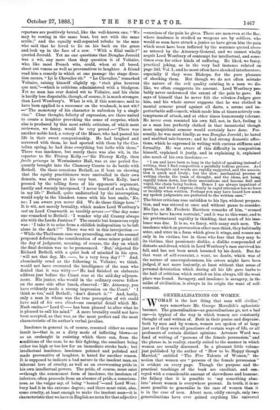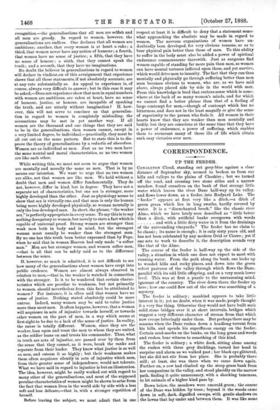GENERALISATIONS ON WOMEN.
st AATOMAN is the last thing that man will civilise," says somewhere Mr. George Meredith's aphoristic baronet. The generalisation—as generalisations go, not a bad one—is typical of the way in which women are constantly thought of and written of. Both in their praise and dispraise, both by men and by women, women are spoken of at large just as if they were all practisers of certain ways of life, or all professors of certain distinct opinions. Artemus Ward was fond of writing of "persons of the female persuasion," and the phrase is, in reality, exactly suited to the manner in which women are usually discussed. In a pleasant little volume just published by the author of "How to be Happy though Married," entitled "The Five Talents of Women," the notion that women are "persons of the female persuasion" is evident on every page. Though the purpose and the practical teachings of the book are excellent, and con- veyed with a considerable amount of shrewdness and humour the fallacy that it is possible to say something abso- lute' about women is everywhere present. In truth, it is no more possible to generalise in the case of women than it is in the case of men. About men, oddly enough, only two generalisations have ever gained anything like universal
recognition,—the generalisations that all men are selfish and all men are greedy. In regard to women, however, the generalisations are endless. One declares that all women are ambitions; another, that every woman is at heart a rake; a third, that women never have any notion of humour; a fourth, that women have no sense of justice; a fifth, that they have no sense of honour; a sixth, that they cannot speak the truth; and a seventh, that they have no imaginations.
No doubt the believer in generalisations in regard to women will declare in vindicat.on of this arraignment that experience shows that all these statements, if not absolutely accurate, are at any rate substantially so. An appeal to experience is, of course, always very difficult to answer; but in this case it may be asked,—Does not experience show that men in equal numbers with women are ambitious, are rakes at heart, have no sense of humour, justice, or honour, are incapable of speaking the truth, and are utterly without imagination? If, how- ever, this will not serve to convince us that generalisa- tion in regard to women is completely misleading, the accusations may be met in yet another way. If all women are the thousand and one things that they are said to be in the generalisations, then women cannot, except in a very limited degree, be individual,—practically, they must be all cut out on the same pattern. But to state this is to dis- prove the theory of generalisations by a reductio ad absurdum. Women are as individual as men. Just as no two men have the same mental and moral characteristics, so no two women are like each other.
While writing this, we must not seem to argue that women are mentally and morally the same as men. That is by no means our intention. We want to urge that no two women are alike, not that women are like men. We hold without a doubt that men and women differ fundamentally. They do not, however, differ in kind, but in degree. They have not a separate set of characteristics, but one sex is stronger, more highly developed than the other. Just as physiology seems to show that sex is virtually one, and that man is only the human being more highly developed physically, so woman mentally is only the less developed man. In short, the phrase, "the weaker sex," is perfectly appropriate in every sense. To say this is to say nothing derogatory to women, but merely to state a fact which is capable of universal proof. Strong women are stronger than weak men both in body and in mind, but the strongest woman must usually be weaker than the strongest man. By no one has this truth been better expressed than by Pope, when he said that in woman Heaven had only made "a softer man." Men are but stronger women, and women softer men, —that is all that can be safely said as to the difference between the sexes.
If, however, so much is admitted, it is not difficult to see how many of the generalisations about women have crept into public credence. Women are almost always observed in relation to men,—that is, the weaker is watched in connection with the stronger. Is it to be wondered that certain charac- teristics which are peculiar to weakness, but not primarily to women, should nevertheless from this fact be attributed to women ? For instance, it is often said that women have no sense of justice. Nothing stated absolutely could be more untrue. Indeed, many women may be said to value justice more than most men. It often happens, however, that a woman will acquiesce in acts of injustice towards herself, or towards other women on the part of men, in a way which seems at first sight to be due to a lack of the sense of justice. In reality, the cause is totally different. Women, since they are the weaker, lean upon and trust the men to whom they are united, as the soldier leans on and trusts his commander. Thus, what in truth are acts of injustice, are passed over by them from the sense that they cannot, as it were, break the ranks and separate from their leader. They know what justice is as well as men, and esteem it as highly ; but their weakness makes them often acquiesce silently in acts of injustice which men, from their greater sense of independence, would not tolerate. What we have said in regard to injustice is but an illustration. The idea, however, might be easily worked out with regard to many other of the generalisations, and most of the supposed peculiar characteristics of women might be shown to arise from the fact that woman lives in the world side by side with a leas soft and less delicate,—that is, with a stronger repetition of herself.
Before leaving the subject, we must admit that in one respect at least it is difficult to deny that a statement some- what approaching the absolute may be made in regard to women. The nervous organisations of women have un- doubtedly been developed, for very obvious reasons, so as to bear physical pain better than those of men. To this ability to suffer in the body must also be added a power of spiritual endurance commensurate therewith. Just as surgeons find women capable of standing far more pain than men, so women can have mental tortures inflicted upon them, and yet survive, which would drive men to insanity. The fact that they can thus mentally and physically go through suffering better than men soon becomes obvious to women, who are, as we have said above, always placed side by side in the world with men. From this knowledge is bred that curious sense which is some- where at the back of so many women's minds, and for which we cannot find a better phrase than that of a feeling of large contempt for men,—though of contempt which has no bitterness, and does not in the least magnify or give the sense of superiority to the person who feels it. All women in their hearts know that they are weaker than men mentally and bodily, but they are conscious at the same time that they have a power of endurance, a power of suffering, which enables them to surmount many of those ills of life which obtain such easy victories over men.







































 Previous page
Previous page